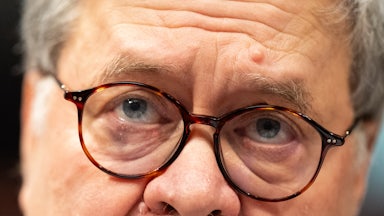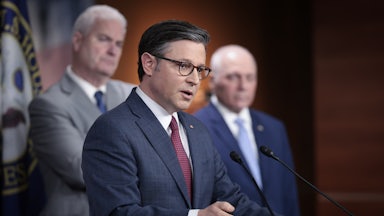President Joe Biden is fond of using a quote from his father to criticize Republicans: “Don’t tell me what you value. Show me your budget, and I’ll tell you what you value.” Late last month, the Biden administration sent its $6 trillion budget plan to Congress for consideration. It’s a pretty good reflection of what he values: Trillions of dollars have been set aside for infrastructure, health care, childcare, education, and climate change, so the country can “build back better,” as he often puts it.
One of the budget’s shortcomings, however, lies where Washington, D.C., is involved. The nation’s capital has spent the last decade trying to fully legalize marijuana and join the majority of states that have chipped away at prohibition over the last decade. Currently, it is legal for adults aged 21 and older to possess small amounts of marijuana, and even give small amounts of it to others as a gift. But it’s not legal to sell it anywhere in the District of Columbia, which means that the city’s lawmakers can neither regulate the drug nor raise revenue from its sales through taxation—a bad outcome for both public health and public coffers.
The city has repeatedly asked Congress for changes to these arrangements. Its hopes have been stymied by a GOP-crafted provision known as the Harris Rider, through which Congress has effectively banned the district from legalizing marijuana in the way many other states have done. In his new budget proposal, Biden kept the rider intact.
It’s an inexplicable move on multiple levels. It cuts against self-government within the nation’s capital, which Biden theoretically favors by supporting D.C. statehood. It imposes an unjustified burden upon a traditionally Democratic constituency. And it represents a deeper missed opportunity for a president who casts himself as a defender of democracy. By refusing to commit fully to marijuana legalization, Biden is losing the chance to prove that American democracy can actually work.
The Harris Rider is an unusually clear example of how marijuana criminalization and democracy are increasingly at odds. The provision is named for Maryland Representative Andy Harris, the only Republican in the state’s House delegation. Harris’s own belief in democracy appears to be lacking. He falsely claimed that there were “large-scale voting irregularities” in the 2020 election and joined other GOP lawmakers to ask the Supreme Court to overturn the presidential election last December. When the House voted to impeach Donald Trump in January for inciting a riot to attack Congress and stop Biden’s victory, Harris bravely voted “present.”
Perhaps Harris’s most successful move against American self-government came in 2014. That year, D.C. voters approved a ballot measure that would allow residents to grow and own small amounts of marijuana. The initiative passed with roughly 70 percent support. In the next federal budget, however, Harris led other Republicans to add a rider to prohibit D.C. from legalizing sales of marijuana, effectively squelching voters’ legalization efforts. The capital’s unique constitutional status left D.C. without any recourse. Eleanor Holmes Norton, D.C.’s delegate to Congress, could not even cast a vote on it.
Though Norton praised other parts of Biden’s budget proposal this week, she criticized his decision to maintain the Harris Rider. Since 2014, Democrats have had limited leverage to remove the provision during budget negotiations because Republicans controlled one or both chambers of Congress. That hurdle no longer exists after Democrats won narrow but genuine majorities in the House and the Senate. Norton found the rider’s presence to be philosophically incompatible with the Biden administration’s support for D.C. statehood.
“I am having a hard time reconciling the administration’s strong support for D.C. statehood, which would give D.C. not only voting representation in Congress but also full local self-government, with a budget that prohibits D.C. from spending its local funds on recreational marijuana commercialization,” she said in a statement on Tuesday. “With Democrats controlling the White House, House, and Senate, we have the best opportunity in over a decade to enact a D.C. appropriations bill that does not contain any anti-home-rule riders.”
In some ways, Biden’s decision to keep the rider isn’t a surprise. He rose to public prominence in the 1980s and 1990s when the “war on drugs” was at its apex and tough-on-crime legislation regularly churned through Congress, often with Biden’s assistance. On the campaign trail, Biden partially retreated from the harsh stances toward marijuana he’d taken in the past, expressing formal support for decriminalization while also saying it should be left up to the states. That support appears to have ebbed since he took office.
To say Biden’s position is at odds with the public’s views is an understatement. It’s clichéd to note that this country is divided on many major issues. But Americans are far more supportive of legalizing marijuana than their political leaders’ actions—or, more accurately, their inactions—would suggest. A Pew survey in April found that 60 percent of Americans said marijuana should be legal for both medical and recreational purposes. An additional 31 percent said it should be legalized for medical purposes only. That left a mere 8 percent who thought it should remain fully criminalized—a bloc of voters that appears to be grossly overrepresented in Washington.
Proponents of legalization often cite the immense social toll of criminalization, which most severely affects communities of color. They also cite the economic potential of the marijuana industry if federal prohibition were to be fully lifted. Increasingly, it’s also a problem of basic self-governance. Thirty states have now legalized or decriminalized marijuana in some form, often by referendum or ballot initiative. They include blue states like California and New York, red states like Mississippi and Nebraska, and purple states like Michigan and Virginia. To the extent that Americans can collectively render a judgment on a single national issue, they have done so convincingly.
Standing against this tide undermines one of Biden’s central visions for his administration. He took office in the wake of Trump’s prolific misconduct and authoritarianism, a spate of attacks on free and fair elections at the state and local level, and a broader turn by the Republican Party against the American people’s right to freely choose their own leaders. At his inauguration in January, Biden linked his presidency to pushing back against this illiberal tide, calling that day “democracy’s day.”
“Today, we celebrate the triumph not of a candidate but of a cause, the cause of democracy,” he said in his inaugural address. “The will of the people has been heard, and the will of the people has been heeded. We have learned again that democracy is precious. Democracy is fragile. And at this hour, my friends, democracy has prevailed.”
Supporting democracy means protecting voting rights and ensuring the peaceful transfer of power. At a certain level, it also means doing what the people want. Sometimes the desires of the public aren’t always clear when the time comes to craft complex legislation or navigate policy trade-offs. But sometimes it is. If Biden really wants to protect American democracy, he can show Americans that their collective will can actually be reflected in policy and practice. Scrapping the Harris Rider and embracing marijuana legalization are good places to start.








